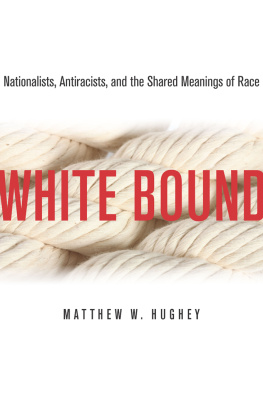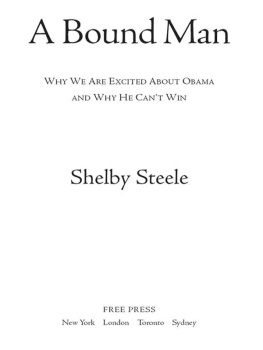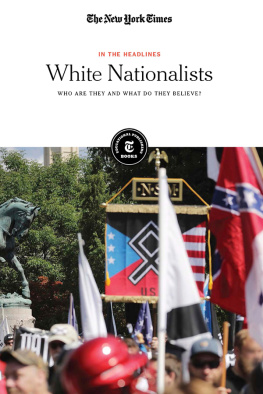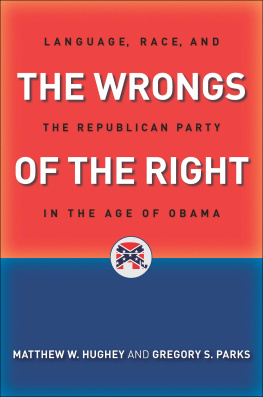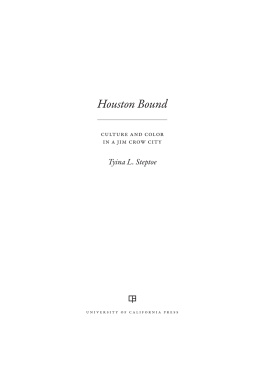Hughey - White Bound: Nationalists, Antiracists, and the Shared Meanings of Race
Here you can read online Hughey - White Bound: Nationalists, Antiracists, and the Shared Meanings of Race full text of the book (entire story) in english for free. Download pdf and epub, get meaning, cover and reviews about this ebook. year: 2012, publisher: Stanford University Press, genre: Politics. Description of the work, (preface) as well as reviews are available. Best literature library LitArk.com created for fans of good reading and offers a wide selection of genres:
Romance novel
Science fiction
Adventure
Detective
Science
History
Home and family
Prose
Art
Politics
Computer
Non-fiction
Religion
Business
Children
Humor
Choose a favorite category and find really read worthwhile books. Enjoy immersion in the world of imagination, feel the emotions of the characters or learn something new for yourself, make an fascinating discovery.
White Bound: Nationalists, Antiracists, and the Shared Meanings of Race: summary, description and annotation
We offer to read an annotation, description, summary or preface (depends on what the author of the book "White Bound: Nationalists, Antiracists, and the Shared Meanings of Race" wrote himself). If you haven't found the necessary information about the book — write in the comments, we will try to find it.
Hughey: author's other books
Who wrote White Bound: Nationalists, Antiracists, and the Shared Meanings of Race? Find out the surname, the name of the author of the book and a list of all author's works by series.
White Bound: Nationalists, Antiracists, and the Shared Meanings of Race — read online for free the complete book (whole text) full work
Below is the text of the book, divided by pages. System saving the place of the last page read, allows you to conveniently read the book "White Bound: Nationalists, Antiracists, and the Shared Meanings of Race" online for free, without having to search again every time where you left off. Put a bookmark, and you can go to the page where you finished reading at any time.
Font size:
Interval:
Bookmark:
White Bound
Nationalists, Antiracists, and the Shared Meanings of Race
Matthew W. Hughey
Stanford University Press
Stanford, California
Stanford University Press
Stanford, California
2012 by the Board of Trustees of the Leland Stanford Junior University.
All rights reserved.
No part of this book may be reproduced or transmitted in any form or by any means, electronic or mechanical, including photocopying and recording, or in any information storage or retrieval system without the prior written permission of Stanford University Press.
Printed in the United States of America on acid-free, archival-quality paper
Library of Congress Cataloging-in-Publication Data
Hughey, Matthew W. (Matthew Windust), author.
White bound : nationalists, antiracists, and the shared meanings of race / Matthew W. Hughey.
pages cm
Includes bibliographical references and index.
ISBN 978-0-8047-7694-3 (cloth : alk. paper)ISBN 978-0-8047-7695-0 (pbk. : alk. paper)ISBN 978-0-8047-8331-6 (e-book)
1. White nationalismUnited States. 2. Anti-racismUnited States. 3. RaceSocial aspectsUnited States. 4. United StatesRace relations. I. Title.
E184.A1H84 2012
305.800973dc23
2012001452
Typeset by Thompson Type in 10/14 Minion
Contents
Chapter 1
Racists versus Antiracists?
Chapter 2
Navigating White Nationalists: National Equality for All
Chapter 3
Everyday Activities with Antiracists: Whites for Racial Justice
Chapter 4
White Panic
Chapter 5
The Ironic Value of Dishonor
Chapter 6
Saviors and Segregation
Chapter 7
Color Capital and White Debt
Chapter 8
Hailing Whiteness
Chapter 9
Beyond Good and Evil
Appendix A
A Primer on Nationalism and Antiracism
Appendix B
Research Methodology
Appendix C
Notes on Decisions, Difficulty, Development, and Dangers
Acknowledgments
It takes a village to raise a book. Through concerted and cooperative effort, many hands brought this project to fruition. Of primary import, the utmost thanks go to the members of both National Equality for All and Whites for Racial Justice. I am appreciative of the courageous and compassionate ways you opened your lives to sociological scrutiny. Although I am confident we will disagree over some of my analysis, we certainly do share a profound concern over the future of race relations and the possibilities of a world without racial conflict.
This text holds the voices of many others to whom I owe direct thanks. In particular, Ira Bashkow, Bethany Bryson, Krishan Kumar, and Jeffrey Olick directly mentored my sociological treatment of race and racial identity formation. In particular, Milton Vickerman provided pragmatic guidance, emotional support, and a keen knowledge of racial theory and history. His open door and academic acumen were always at the ready. Thank you, Milton.
Quite a few others lent their hand to this books binding. Sharon Hays gave me a tool kit stocked with theory on cultural sociology, ethnography, and inequality. She reminded me that the writing of people is always an ethical and political project that deserves utmost care. Wende Marshall was kind enough to bring her erudite knowledge of cultural anthropology to bear on the problem of white supremacy. Corey D. B. Walkers mantra that theory works in the interests of certain people was a welcome specter that haunted my writing. Eduardo Bonilla-Silva, David Brunsma, Ashley Woody Doane, Joe Feagin, Grace Hale, Claudrena Harold, John Hartigan Jr., Kimberly Kelly, Amanda Lewis, Allison Pugh, Josipa Roksa, and Donald Shaffer all dropped jewels of wisdom that now enrich this text. Tristan Bridges, Todne Thomas Chipumuro, Carey Sargent, and Hephzibah Strmic-Pawl provided strong collegiality and intellectual insight that carried me through both data collection and analysis.
I am especially indebted to the students in my Sociological Perspectives on Whiteness classes at the University of Virginia. The discussion and argumentation in those spaces proved essential. It was a blessing to simultaneously research, write, and teach on white racial identity. In this vein, I am thankful to Cynthia Hoehler-Fatton, then Interim Director of the Carter G. Woodson Institute for Afro-American and African Studies, for going to bat for such a course.
I would be remiss if I did not acknowledge the years of navigational support from Joan Snapp and Katherine Shiflett in the Department of Sociology at the University of Virginia. As the gatekeepers of departmental and institutional knowledge, they were lighthouses in the fog of bureaucracy. I remain thankful for the countless pep talks throughout the years.
Completing a book is not just a matter of cerebral inspiration but is also an endeavor of material pragmatism. My daily sustenance came from an array of sources. The Ford Foundation Fellowship honorable mention, the Phelps-Stokes Fellowship, Seven Society & Teaching Resource Center Fellowships, the Charles H. and Nancy E. Evans Fellowship, and the University of Virginia College of Arts and Sciences Society of Fellows Grant all helped cover the costs of living and time spent in the ethnographic field. Also, I am indebted to the Carter G. Woodson Institute for Afro-American and African Studies and the Departments of African American Studies, Media Studies, and Sociology at the University of Virginia for affording me affiliate faculty positions. Finally, landing a tenure track position at Mississippi State University (during a moment of economic catastrophe) allowed me to bring this project home.
Stanford University Press and its associates have been a windfall of support. From the insight supplied by the anonymous reviewers, the editorial board, the work of assistant editors Joa Suorez and Clementine Breslin, and the copyediting of Margaret Pinette, to the countless readings and suggestionsboth large and smallof executive editor Kate Wahl, everyone at Stanford made this book all the better for their efforts. In short, their work has been outstanding.
Lastly, I offer thanks to my parents who, while enduring financial hardship, helped sustain me by providing a place to live and work in peace and quiet. Their material, emotional, and spiritual buttressing of this endeavor can never be sufficiently repaid. I remain eternally grateful for their unwavering support.
Racists versus Antiracists?
White antiracists? Misguided folks, but I get them, I mean, [long pause] they want to have equality and multiculturalism, and so do we... In many ways, we are not all that different. In fact, I consider myself one of them [laughing]. I dont use your language, but yeah, Im a white antiracist!
Robert, National Equality for All
The white nationalist movement today, they are using our rhetoric, our ideas... because they feel threatened. I guess on some level they want to be respected as individual human beings, just like we want all people to be respected as human beings. Thats similar... in a strange sort of way.
Philip, Whites for Racial Justice
A large oak table with papers, books, and several coffee cups strewn about occupies the middle of the room. Numerous people sit in bulky, inflexible chairs. Some type on laptops, several busy themselves with reading, and others jot down notes on yellow legal pads. A few people scurry about the room, dive in and out of file cabinets, briefly speak with colleagues, and wait for a turn at one of the few computers to send an email or look up needed information. The phone has been ringing incessantly for the past hour. Call after call is fielded, schedules double-checked, and appointments made. People are a bit on edge. Still, most manage to smile and remain courteous to one another. In less than a week, it will be the anniversary of Dr. Martin Luther King Jr.s birthdaya U.S. federal holiday since 1986. People are readying their commemoration of the day by preparing press packets about the life and legacy of Dr. King to disseminate to radio, tv, and blogs. Derek, a thirty-four-year-old advertising and marketing agent, sits down beside me. Seemingly exhausted, he slumps into the chair with a deep sigh. He removes his glasses with his left hand, holding them unfolded in his outstretched arm. With his right hand he loosens his tie and undoes the top button of his shirt. For more than a few moments he slowly rubs his forehead as if trying to massage away a deadening headache. After some time he slowly replaces his glasses, looks down at the floor, and says in a low tone: Its hard to fight all the disinformation out there... his voice trailing off as he speaks. But! he asserts emphatically as he turns to look at me, placing his hand on my shoulder. Weve got to get the truth out there to people. This is one of the few times each year when people will really listen. Derek smiles and rises from his seat to greet a colleague who has entered the room. I think the big selling point we have, says Derek, looking back at me as his colleague walks up to greet him with a handshake, is that King was against affirmative action, were not saying anything different.... We as white people must protect our racial heritage and separate. That is the key to our self-determination. This is The Office, the unofficial moniker for the national headquarters of National Equality for All, a white nationalist organization located in a metropolitan area on the East Coast of the United States.
Next pageFont size:
Interval:
Bookmark:
Similar books «White Bound: Nationalists, Antiracists, and the Shared Meanings of Race»
Look at similar books to White Bound: Nationalists, Antiracists, and the Shared Meanings of Race. We have selected literature similar in name and meaning in the hope of providing readers with more options to find new, interesting, not yet read works.
Discussion, reviews of the book White Bound: Nationalists, Antiracists, and the Shared Meanings of Race and just readers' own opinions. Leave your comments, write what you think about the work, its meaning or the main characters. Specify what exactly you liked and what you didn't like, and why you think so.

